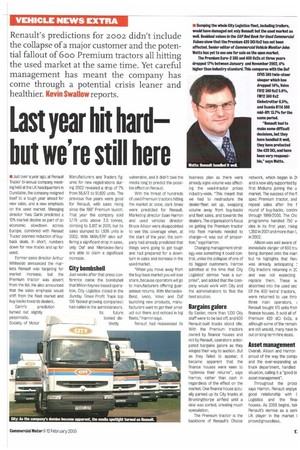Last year hit hard but we're still here
Page 17

If you've noticed an error in this article please click here to report it so we can fix it.
Ill Just over a year ago, at Renault Trucks' bi-annual company meeting held at the UK headquarters in Dunstable, the company resigned itself to a tough year ahead for new sales, and a new emphasis on the used market. Managing director Yves Garin predicted a 10% market decline as part of an economic slowdown across Europe, combined with Renault Trucks' planned reduction of buyback deals. In short, numbers down for new trucks and up for used.
Former sales director Arthur Whiteside announced the markets Renault was targeting for market increase, but the Premium tractor was absent from the list. He also announced that the sales emphasis would shift from the fleet market and buy-backs towards dealers.
Garin's prediction turned out slightly pessimistic.
Society of Motor Manufacturers and Traders figures for new registrations during 2002 revealed a drop of 7% from 55,573 to 51,920 units. The previous five years were good for Renault, with sales rising since the 1997 Premium launch. That year the company sold 1,779 units above 3.5 tonnes, climbing to 3,817 in 2001, but its sales slumped to 1,936 units in 2002. With MAN/ERF also suffering a significant drop in sales, only Daf and Mercedes-Benz are able to claim a significant increase.
City bombshell
Just weeks after that press conference came the bombshell that Milton Keynes-based operation, City Logistics (listed in the Sunday Times Profit Track top 100 fastest-growing companies) had called in the administrators.
Its future looked distinctly vulnerable, and it didn't take the media long to predict the possible effect on Renault.
With the threat of hundreds of used Premium tractors hitting the market at once, dark times were predicted for Renault. Marketing director Euan Herron and used vehicles director Bruce Allison were disappointed to see this coverage when, at the start of the year, the company had already predicted that things were going to get tough and had prepared for a downturn in sales and increase in the used market.
"When you move away from the buy-back market you will lose share, because operators will go to manufacturers offering guaranteed returns. With MercedesBenz, Ivaco, Volvo and Daf launching new products, manufacturers want to get their product out there and noticed in big fleets," Harron says.
Renault had reassessed its business plan as there were already signs volume was affecting the used-tractor prices industry-wide. "This meant that we had to restructure the dealer/fleet set up, swapping volume away from buy-backs and fleet sales, and towards the dealers. The organisation's focus on getting the Premium tractor into fleet markets needed to change—it was out of proportion," says Herron.
Changing management strategy was something it could control, unlike the collapse of one of its biggest customers. Harron admitted at the time that City Logistics' demise "was a surprise", and added that the company would work with City and the administrators to find the best solution.
Bargains galore
By Easter, more than 1,100 City staff were to be laid off, and 600 Renault-built trucks stood idle. With the Premium tractors owned by finance houses and not by Renault, operators anticipated bargains galore as they winged their way to auction. But as they failed to appear, it became apparent that the finance houses were keen to "optimise their returns", says Harron, rather than cash in regardless of the effect on the market. One finance house actually parked up its City trucks at Bruntingthorpe airfield until a deal was sorted, creating much speculation.
The Premium tractor is the backbone of Renault's Choice
network, which began in 21 and is now ably supported by first Midlums joining the u market. The success of the fl spec Premium tractor, and repeat sales after the f round of buy-backs, contini through 1999/2000. The Chc programme handled 750 v, cies in its first year, rising 1,350 in 2001 and more than 1, in 2002.
Allison was well aware of immediate danger of 600 tru being dumped onto the marl but he highlights that Ren; was already anticipating City tractors returning in 2C and was not expecting replace them. These w absorbed into the used sec Of the 400 'extra' tractors, were returned to use thro three main operators. ; Renault bought 175 units tor finance houses. It sold all of Premium 420 dCi 6x2s, a although some of the remain, are still unsold, many have bi out on long-term hire deals.
Asset management
Overall, Allison and Harron proud of the way the comp and the ever-expanding us truck department, handled situation, calling it a "good bi asset management".
Throughout the procE says Herron, Renault enjoye good relationship with ( Logistics and the final houses. As 2003 begins, tab Renault's demise as a seril UK player in the market I proved groundless.




























































































































































